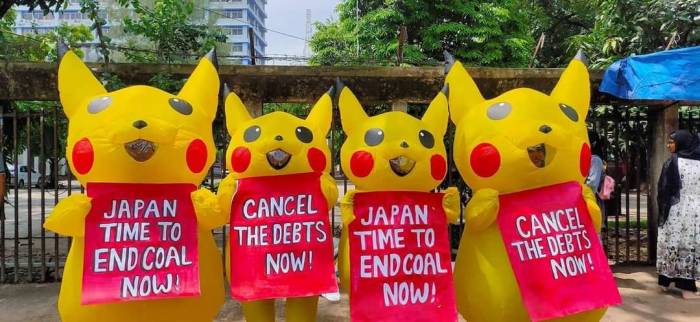

Young people in Pikachu costumes protest Japan’s funding of coal projects in Bangladesh. Photo: Youthnet
Today, Japan is attending the G7 summit in London to tackle climate finance while at the same time, still funding coal plants in Bangladesh, a climate-vulnerable nation. Japan must commit to end public financing of the Matarbari Phase 2 coal plant project in Bangladesh.
The JICA funded Phase 1 of the Matarbari coal plant is already mired in controversy. The first two turbines of the Matarbari plant (phase 1) are built on land for shrimp farming, crop, and salt production, which has destroyed the livelihoods of Matarbari residents. Those displaced by the project were not given prior notice as required by the Land Acquisition Act 1982, and have not been met with fair compensation, livelihood restoration, and resettlement. Some had to pay 30 percent as a bribe to get the compensation. Only a fraction of the 1,057 people previously employed by the salt and shrimp farm have found alternative employment.
Pollution from the Matarbari power plant (Phase-1) is estimated to cause up to 14,000 premature deaths during its operational years. Air quality in Bangladesh is already ranked as the worst in the world and air pollution was the 3rd leading risk factor for mortality in Bangladesh, accounting for almost 14% of deaths (123,000) in 2017 alone. JICA finance to Matarbari coal plants would be linked to deaths in Bangladesh
Japan’s continued support for coal and funding of the Matarbari coal plant projects in Bangladesh undermines the effort for a just transition to renewable energy. A growing movement in Bangladesh calls on the Government to enact a “Green New Deal” and halt all coal power projects, including the Japan International Cooperation Agency-funded Phase 2 Matarbari coal plant. As Bangladesh reels under continued climate-induced disasters, Japan would do well by supporting renewable energy development and help the country to leapfrog towards a sustainable future.
The COVID-19 pandemic has shown that we need to build back better. As a climate-vulnerable country, Bangladesh needs support from Japan and developed countries to build renewable energy infrastructure and bring its people out of poverty. JICA would save lives in Bangladesh by supporting renewable energy, not coal.


0 Commentaires